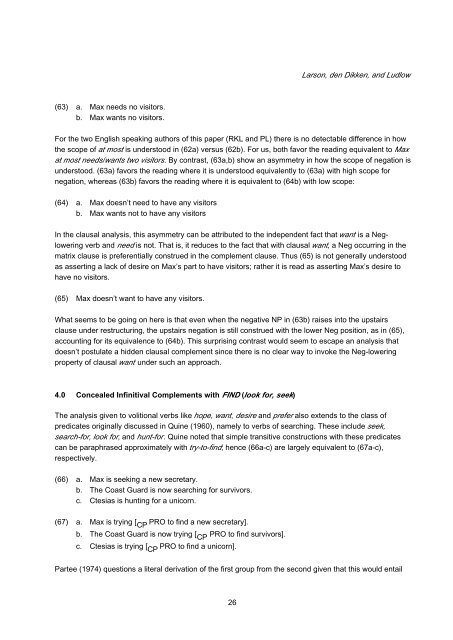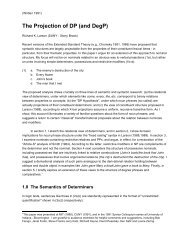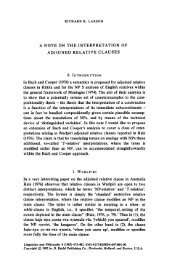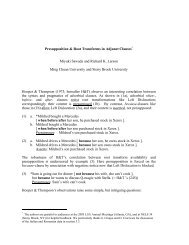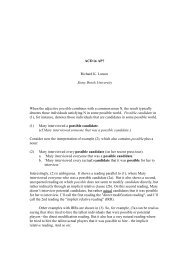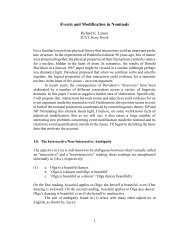Intensional Transitive Verbs and Abstract Clausal Complementation
Intensional Transitive Verbs and Abstract Clausal Complementation
Intensional Transitive Verbs and Abstract Clausal Complementation
Create successful ePaper yourself
Turn your PDF publications into a flip-book with our unique Google optimized e-Paper software.
(63) a. Max needs no visitors.<br />
b. Max wants no visitors.<br />
Larson, den Dikken, <strong>and</strong> Ludlow<br />
For the two English speaking authors of this paper (RKL <strong>and</strong> PL) there is no detectable difference in how<br />
the scope of at most is understood in (62a) versus (62b). For us, both favor the reading equivalent to Max<br />
at most needs/wants two visitors. By contrast, (63a,b) show an asymmetry in how the scope of negation is<br />
understood. (63a) favors the reading where it is understood equivalently to (63a) with high scope for<br />
negation, whereas (63b) favors the reading where it is equivalent to (64b) with low scope:<br />
(64) a. Max doesn’t need to have any visitors<br />
b. Max wants not to have any visitors<br />
In the clausal analysis, this asymmetry can be attributed to the independent fact that want is a Neglowering<br />
verb <strong>and</strong> need is not. That is, it reduces to the fact that with clausal want, a Neg occurring in the<br />
matrix clause is preferentially construed in the complement clause. Thus (65) is not generally understood<br />
as asserting a lack of desire on Max’s part to have visitors; rather it is read as asserting Max’s desire to<br />
have no visitors.<br />
(65) Max doesn’t want to have any visitors.<br />
What seems to be going on here is that even when the negative NP in (63b) raises into the upstairs<br />
clause under restructuring, the upstairs negation is still construed with the lower Neg position, as in (65),<br />
accounting for its equivalence to (64b). This surprising contrast would seem to escape an analysis that<br />
doesn’t postulate a hidden clausal complement since there is no clear way to invoke the Neg-lowering<br />
property of clausal want under such an approach.<br />
4.0 Concealed Infinitival Complements with FIND (look for, seek)<br />
The analysis given to volitional verbs like hope, want, desire <strong>and</strong> prefer also extends to the class of<br />
predicates originally discussed in Quine (1960), namely to verbs of searching. These include seek,<br />
search-for, look for, <strong>and</strong> hunt-for. Quine noted that simple transitive constructions with these predicates<br />
can be paraphrased approximately with try-to-find; hence (66a-c) are largely equivalent to (67a-c),<br />
respectively.<br />
(66) a. Max is seeking a new secretary.<br />
b. The Coast Guard is now searching for survivors.<br />
c. Ctesias is hunting for a unicorn.<br />
(67) a. Max is trying [ CP PRO to find a new secretary].<br />
b. The Coast Guard is now trying [ CP PRO to find survivors].<br />
c. Ctesias is trying [ CP PRO to find a unicorn].<br />
Partee (1974) questions a literal derivation of the first group from the second given that this would entail<br />
26


